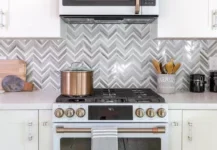When it comes to designing the perfect bathroom, selecting the ideal shower wall material is crucial. But with so many options available, you might wonder, “what are showers made of?” In this blog post, we will explore the pros and cons of various shower wall materials, discuss customization and installation options, offer tips on maintenance and longevity, and help you make an informed decision that suits your budget, personal style, and installation preferences.
Key Takeaways
- Explore the various shower wall materials available, including acrylic, fiberglass, natural stone and ceramic/porcelain tiles.
- Consider customization options such as glass or laminate panels to achieve a personalized look for your bathroom.
- Proper maintenance is key to ensure long lasting walls. Budgeting for initial costs and potential upkeep expenses will help make an informed decision that best suits your design vision.
Bathroom Shower Ideas
When it comes to transforming your bathroom into a serene oasis, exploring a variety of bathroom shower ideas is essential. Whether you’re renovating a small space or working with a more extensive area, the possibilities for creating an inviting and functional shower space are endless. From luxurious spa-inspired designs to space-saving solutions for compact bathrooms, these bathroom shower ideas can help you achieve the perfect balance of style and functionality. Consider features like rainfall showerheads, mosaic tiles, glass enclosures, and built-in niches to enhance your shower experience
Exploring Shower Wall Materials
Selecting the best shower wall material for your bathroom calls for a careful consideration of factors like durability, aesthetics, and maintenance requirements. Some of the most common materials include:
- Acrylic
- Fiberglass
- Natural stone
- Ceramic or porcelain tiles
Acrylic and fiberglass shower walls are popular choices due to their affordability and low maintenance requirements. On the other hand, natural stone tiles offer a luxurious and unique aesthetic but necessitate regular sealing and upkeep. Ceramic and porcelain tile walls provide a vast selection of designs and colors, and are water and stain-resistant.
We’ll further examine each of these materials to gain a better understanding of their features and potential downsides.

Acrylic Shower Walls
Acrylic shower walls are an economical and mold-resistant option, available in various colors, patterns, and styles. Many homeowners choose acrylic for its cost-effectiveness and resistance to mold. However, acrylic shower walls are vulnerable to scratching, rubbing, and impact damage. Care should be taken to avoid damaging the material during installation and use, especially when installing acrylic shower walls.
In spite of these drawbacks, many homeowners still opt for acrylic, drawn by its affordability and versatility. When compared to fiberglass, acrylic is less susceptible to scratching and features an appealing gloss, while fiberglass is more prone to becoming scratched or faded but is more economical.
Fiberglass Shower Walls
Fiberglass shower walls are known for their durability, sound insulation capabilities, and mold-resistant properties. Constructed from fiberglass-reinforced plastic, these shower walls are water-resistant and can be finished with high gloss or matte paint, panels that simulate marble and stone, or acrylic finishes.
However, fiberglass shower walls cannot guarantee a secure seal for walls or ceilings, and they are prone to scratching. A balanced assessment of the pros and cons of each material, together with your personal preferences and budget, should guide your choice between acrylic and fiberglass.
Natural Stone Tile

Natural stone tiles, such as marble, granite, and slate, provide a luxurious and sophisticated material often used for shower walls. They offer a unique and high-end aesthetic, with extended longevity and robustness. However, the primary disadvantage of utilizing natural stone tiles for shower walls is that they are porous and necessitate frequent sealing and upkeep.
Regular sealing and cleaning of natural stone shower walls are required steps to maintain their aesthetic appeal and prevent staining. While natural stone may be more expensive and require additional maintenance than other materials, its luxurious and timeless look makes it a popular choice for those who value style and elegance.
Ceramic and Porcelain Tiles
Ceramic and porcelain tiles are popular choices for shower walls due to their versatility, stain resistance, and affordability. Ceramic shower tiles, in particular, boast excellent water and stain resistance, and their grout and tiles are easy to maintain. With ceramic shower walls and porcelain shower walls, you can enjoy cost-effectiveness, water resistance, and durability, making them convenient and attractive options.
However, ceramic and porcelain tiles may require more maintenance than some other materials to prevent mold growth. It is advised to clean them at least once a week to avoid mold and mildew. Despite this additional upkeep, ceramic and porcelain tiles remain a popular choice for many homeowners due to their attractive appearance and practical benefits.
Customization and Installation

Aside from selecting the right material for your shower walls, customization and installation are also important factors to consider. Many materials offer a wide range of options, including:
- Colors
- Patterns
- Sizes
- Shapes
This allows you to create a truly personalized look for your bathroom.
We’ll examine some of the customization and installation alternatives for various shower wall materials, considering different shower wall options.
Glass Tiles
Glass tiles offer a high-end aesthetic, with various finishes, colors, shapes, and sizes available. They are easy to clean and resistant to mold and mildew growth, making them a popular choice for shower walls. However, glass tiles can be expensive, difficult to install, and prone to scratches.
Careful adherence to the manufacturer’s instructions and the use of suitable tools and techniques are crucial in preventing damage during the installation of glass tiles. With proper installation and care, glass tiles can create a stunning and modern look in your bathroom.
Laminate Panels
Laminate panels are a budget-friendly option that can be applied directly to existing tiles, offering a mold-free and easy-to-clean surface. They are available in a variety of styles, such as:
- PVC wall panels
- Fiberglass-reinforced plastic (FRP) panels
- Acrylic wall panels
- Laminated bathroom shower wall panels
While laminate panels are lightweight and simple to install, their durability may vary, and some laminate panels with wood cores may be prone to warping if exposed to excessive water.
Despite these potential drawbacks, laminate panels remain a popular choice for those on a budget seeking a low-maintenance and attractive shower wall option.
Stand Up Shower with Seat
A stand up shower with seat is a practical and stylish addition to any bathroom. If you’re looking for a way to enhance your bathing experience, a stand-up shower with a seat can provide the ultimate comfort and convenience. These showers are specifically designed to offer a comfortable seating option while you shower, making it ideal for individuals who may have mobility concerns or simply desire a more relaxing bathing experience.
The seat in a stand-up shower is typically built right into the design, providing a sturdy and comfortable spot to sit while you bathe.
Solid Surface Shower Walls

Solid surface shower walls are an affordable, mold-resistant, and stylish solution for shower walls. They are crafted from non-porous materials, making them highly resistant to mold and mildew. Additionally, they are available in various colors and styles to complement your bathroom’s aesthetic.
However, solid surface shower walls may be susceptible to damage from impacts and can be challenging to repair. The specific repair method may vary depending on the extent and type of damage, so it is advisable to consult the manufacturer’s instructions or seek professional advice if needed.
Maintenance and Longevity

Regardless of the material you opt for, diligent maintenance is critical to guarantee the longevity of your shower walls. Different materials have varying maintenance requirements, so it is important to understand the specific care needs of your chosen material to keep your shower looking its best for years to come.
Sealing and Cleaning Natural Stone
Regular sealing and cleaning are necessary for natural stone shower walls to maintain their appearance and prevent staining. To preserve the aesthetic appeal and avoid staining, it is recommended to seal natural stone shower walls annually and clean them regularly, at least once a week or as necessary.
It is crucial to use a gentle cleaner and steer clear of harsh chemicals or abrasive materials that could harm the stone and its sealants when cleaning natural stone. Proper sealing and cleaning will help ensure the longevity and beauty of your natural stone shower walls.
Preventing Mold and Mildew
Proper ventilation and weekly cleaning can help prevent mold and mildew growth on shower walls, especially for ceramic and porcelain tiles. Utilizing a fan or opening a window after each shower can help reduce humidity levels and keep your shower dry.
In addition to proper ventilation, it is important to clean your shower walls regularly to prevent mold and mildew growth. Using a mildew-resistant shower curtain or liner and cleaning the tiles at least once a week can help maintain a clean and healthy shower environment.
Repairing Damage
Repairing damage to shower walls depends on the material, with some options like acrylic and fiberglass being more affordable and easier to repair than others. For minor damage, such as small cracks and chips, a two-part epoxy can be used. For larger cracks, professional repair may be necessary.
Consulting the manufacturer’s instructions or seeking professional advice is advisable when it comes to repairing damage to your specific shower wall material. Proper care and repair will help ensure the longevity and appearance of your shower walls.
Selecting the Right Material for Your Shower

With so many options available, selecting the right material for your shower walls can be a daunting task. Factors such as your budget, personal style, and installation preferences should play a key role in your decision-making process. By carefully evaluating the various materials and their associated pros and cons, you can make an informed choice that will enhance the beauty, functionality, and longevity of your bathroom.
Budget Considerations
Consideration of both the initial cost of the materials and any potential long-term maintenance expenses is crucial when selecting a shower wall material. Some materials, like acrylic and fiberglass, are more affordable, while options like natural stone and glass tiles may come with a higher price tag.
Additionally, consider the potential costs of professional installation, if necessary. By carefully evaluating your budget and the costs associated with different materials, you can make an informed decision that will suit your financial constraints and deliver the best value for your investment.
Style and Aesthetics
In addition to budget, your personal style and the overall aesthetic of your bathroom are important factors to consider when selecting a shower wall material. Natural stone tiles, for example, offer a luxurious and unique look but may require more maintenance than other materials.
On the other hand, glass tiles can create a modern and sleek design, but may be more expensive and difficult to install. Consider the desired look and feel of your bathroom when selecting a material, and choose one that complements your overall design vision.
DIY vs. Professional Installation
The decision to undertake a DIY installation or hire a professional for your shower wall project hinges on the complexity of the chosen material and your personal level of expertise. Some materials, like acrylic and fiberglass, are easier to install and may be suitable for DIY projects.
However, other materials, such as natural stone or glass tiles, may require professional installation to ensure proper handling and installation techniques are used. Consider your level of expertise and the complexity of the chosen material when deciding whether to undertake a DIY project or hire a professional to ensure the best outcome for your shower walls.
How to Build a Shower from Scratch
When you’re faced with the task of creating a new shower from the ground up, understanding “how to build a shower from scratch” is crucial. This comprehensive guide will walk you through the essential steps to ensure a successful DIY project. From planning and framing to waterproofing and tiling, we’ll cover each phase of the process, making it easier for you to achieve a fully functional and aesthetically pleasing shower in your bathroom.
Summary
In conclusion, selecting the right shower wall material involves careful consideration of your budget, personal style, and installation preferences. By exploring the various materials, understanding their maintenance requirements, and evaluating the pros and cons of each option, you can make an informed decision that will enhance the beauty, functionality, and longevity of your bathroom. Remember, a well-chosen shower wall material can transform your bathroom into a sanctuary, providing both style and durability for years to come.
Frequently Asked Questions
How do I know if my shower is fiberglass or acrylic?
To identify if your shower is fiberglass or acrylic, go into your bathroom and touch the surface of your tub with your hand – if it’s cool, you likely have a fiberglass tub. If it’s neutral or warm to the touch, it’s an acrylic bathtub.
What material are bathroom showers made of?
Shower walls are commonly made of glass, acrylic, concrete, and porcelain, offering a range of options to choose from depending on budget, style, and maintenance requirements.
How often should I clean and seal natural stone shower walls?
Seal natural stone shower walls once a year and clean them at least once a week or as needed.
How can I prevent mold and mildew growth on my shower walls?
To prevent mold and mildew growth on shower walls, ensure proper ventilation, keep the area clean, and use a mildew-resistant shower curtain or liner.
The post Uncovering the Best Materials for Shower Walls: What are Showers Made Of? appeared first on Kitchen Infinity.
kitcheninfinity.com










